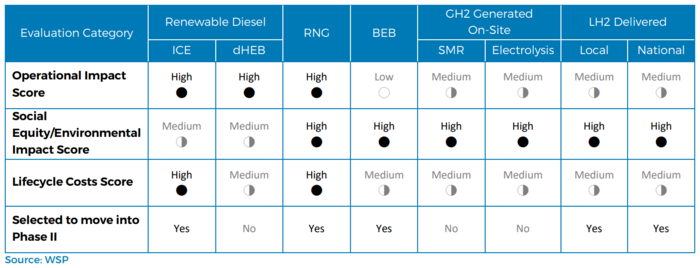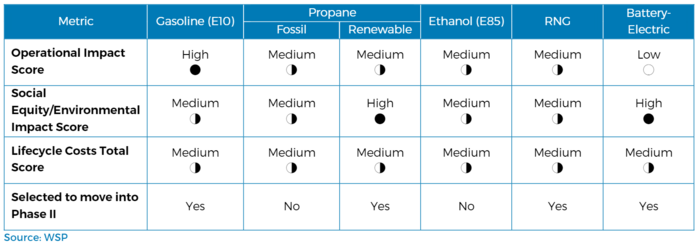Our Journey to a More Sustainable Fleet

Background
Short-term
- Purchase 25 electric buses by 2023
Long-term
- Reduce greenhouse gas (GHG) emissions 75% by 2030
- 100% fleet turnover and phase out fossil fuels by 2035
Additional considerations
- Explore emerging technology and fuel options
- Work with partner jurisdictions to set joint GHG emissions reduction goals
- Review progress and goals annually

About the Fleet Procurement Plan
Process
-
Which Fuels Did LTD Evaluate?
-
In Phase 1 of the project, we evaluated the following fuel options for our fleet of buses:
- R99 Renewable Diesel (currently in use)
- Renewable Natural Gas
- Hydrogen (and its varying forms of production and delivery)
- Battery Electric
We'll also evaluated the following fuels for our RideSource fleet:
- E10 Gasoline (currently in use)
- E85 Ethanol
- Renewable Propane
- Renewable Natural Gas
- Hydrogen (and its varying forms of production and delivery)
- Battery Electric
To learn more about the types of fuels LTD is evaluating, download the Alternative Fuels Update.
-
What Evaluation Criteria Did LTD Use?
-
We're taking a comprehensive approach to selecting the fuels and technologies that will provide transportation for our community throughout the next 15 years. The Fleet Procurement Plan considers the technical aspects of efficient natural resource use, impacts on the community and financial responsibility. This is called a triple-bottom-line approach, and is the core of LTD's sustainability mission.
With input from industry experts, LTD developed the following criteria to evaluate the fuels listed above:
Operational Impacts
- Vehicle range and duty cycle
- Physical space requirements
- Fueling/charging time
Social Equity/Environmental Impacts
- Ability to meet goal of reducing tailpipe GHG emissions by 75%
- Lifecycle GHG emissions
- Ability to meet goal of becoming fossil fuel free by 2035
- Impact on local air quality
Lifecycle Costs
- Capital cost (vehicle)
- Capital cost (infrastructure)
- Operating cost (fuel and maintenance)
- Financial incentives
Other Considerations
- Disaster resiliency
- Long-term fuel availability
-
How Did LTD Use the Criteria?
-
Each of the criteria above were weighted based on their relative importance to achieving LTD's triple-bottom-line sustainability mission. These weights were determined by a team of employees at LTD, including mechanics, department directors, operations supervisors, transportation planners, and others.
-
Who Reviewed the District's Work?
-
To ensure the accuracy of our work and prevent bias, our internal analysis of the fuel alternatives will be reviewed by a team of external subject matter experts. These experts have been recruited from a variety of backgrounds, experiences and organizations, including:
- Northwest Alliance for Clean Transportation
- Metropolitan Wastewater Management Commission
- Lane County
- Ballard Power
- Eugene Water & Electric Board
- Springfield Utility Board
- NW Natural
- City of Eugene
- Columbia Willamette Clean Cities Coalition
- Beyond Toxics
- NAACP
- Oregon Clean Fuels Program
- Representatives from current liquid fuel providers, including Carson, Tyree, Christensen, Petroleum Traders, Wilcox and Flagel, McCall, Oregon Petroleum Transport Company, Bluestar Propane and Rousch
-
What Other Considerations Did LTD Make With This Project?
-
The Fleet Procurement Plan considers the life cycle of sustainability for fuel and vehicle options, such as how materials are sourced and transported, long-term performance of vehicles and charging technology, reliability of manufacturers and vehicles, necessary maintenance and repairs, and coordination with power and utility companies. We're thinking short-term and long-term, considering what it will take to implement changes and what vehicle replacement might look like as these buses age.
To make this project successful, we must maintain a narrow scope, which means the following will not be considered in this project:
- Evaluation of route changes. This is done through a separate process. Details about our service planning projects can be found on the Projects & Planning webpage.
- Impacts to social equity beyond the many benefits already mentioned. LTD respects civil rights and adheres to Title VI policy. We conduct ongoing research on the intersection of transportation and social equity, which can be found in the Reports, Records, Plans & Policies section of the Projects & Planning webpage.
Results
-
Phase 1 Results
-
To evaluate each fuel/technology, data for each metric were collected, processed, and scored based on a zero-to-two scale. A zero (or “low”) was assigned if the fuel/technology doesn’t meet criteria or was dramatically lower than other scores (i.e. if emissions exceed Policy goals), a one (or “medium”) was assigned if the fuel/technology moderately meets the criteria, and a two (or “high”) was assigned if the fuel/technology meets or exceeds the criteria. Some metrics use LTD’s existing conditions as a baseline for comparison, whereas other metrics’ scores are relative to the fuels/technologies being analyzed. Each score was rounded to the nearest whole number and presented as a Harvey ball symbol for ease of understanding and analysis.

Results: Transit Fleet
Phase 1 results for the Transit Fleet concluded that renewable diesel continues to be used as a transition fuel for LTD’s ICE vehicles and either Renewable Natural Gas (RNG), battery-electric buses (BEB), or locally- or nationally-delivered liquid hydrogen as a long-term solution. See the full Phase 1 report for the Transit Fleet.

Results: Paratransit Fleet
Phase 1 results for the Paratransit Fleet concluded that gasoline continues to be used as a transition fuel for LTD’s ICE vehicles and either Renewable Propane, Renewable Natural Gas (RNG), or battery-electric vehicles as a long-term solution. See the full Phase 1 report for the Paratransit Fleet.

-
Phase 2 Results
- After analyzing data collected in Phase 1, LTD completed Phase 2 of the Fleet Procurement Plan in April 2023. Download the final Fleet Procurement Plan Report.

